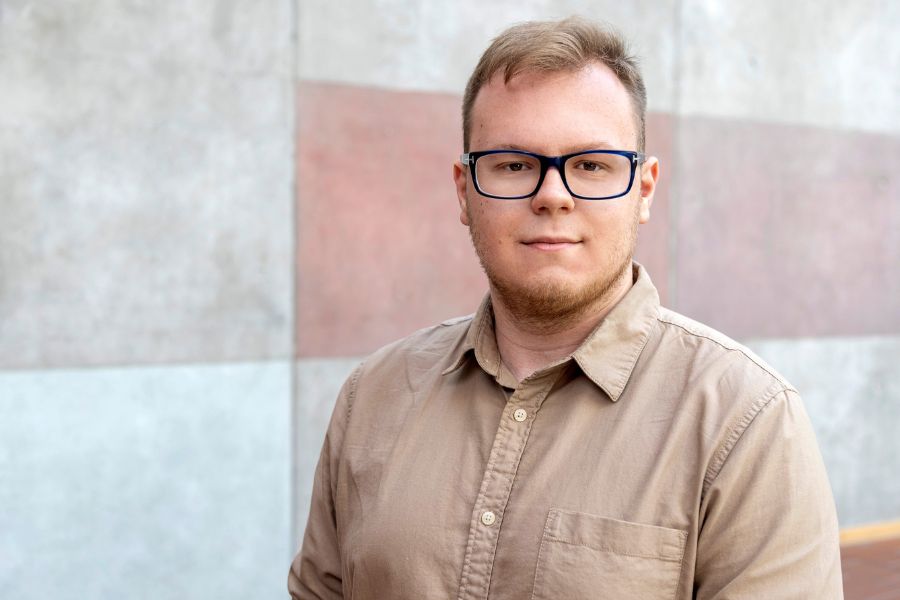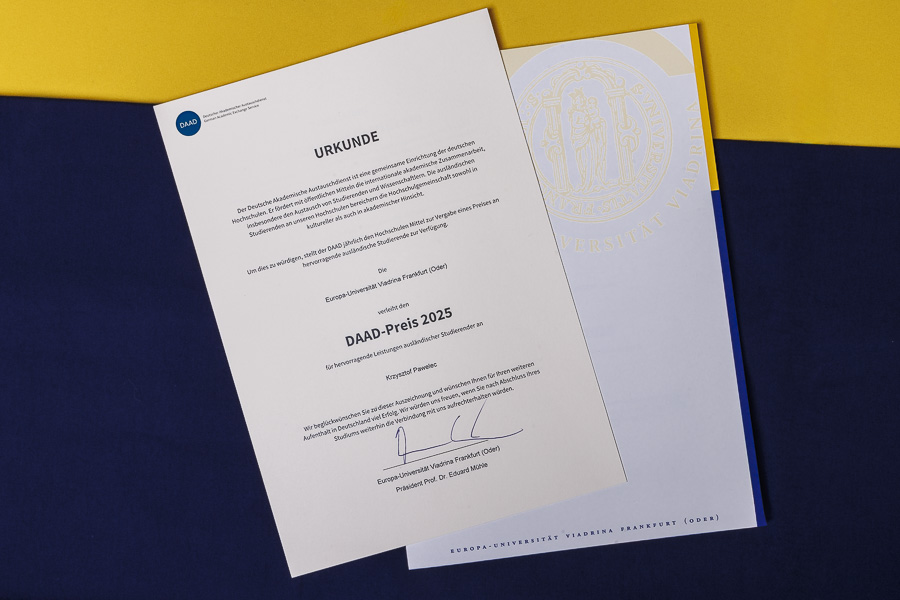DAAD prize winner Krzysztof Pawelec about the potential of intercultural education
Krzysztof Pawelec is the winner of the DAAD Prize 2025. The Master's student completed his Bachelor of Law at the Viadrina in 2023 and is continueing his German-Polish Legal Studies this year. He is currently working as a Junior Legal Specialist in an international telecommunications company in Warsaw. The main reason for the jury's decision was his commitment to providing German-Polish legal advice to people in need in Frankfurt (Oder) and Słubice.
Mr Pawelec, what made you decide to study German-Polish Law at the Viadrina in 2020?
My studies at the Viadrina were a happy coincidence. After graduating from high school, I saw the Viadrina's offer and applied at short notice. The concept of combining two languages and perspectives convinced me.
In retrospect, the Viadrina offered an exceptional environment that helped me shape my professional career and enriched my personality. These experiences will benefit me on my professional path.

Heide Fest
You have been very engaged in ELSA, a Europe-wide association of law students, since 2023 and you are also its President at the Frankfurt (Oder) office. How has your work at ELSA changed your view of international legal issues?
ELSA - The European Law Students' Association - supports law students in their development and combines theory with practice. The association offers excellent opportunities to gain international experience - at events, competitions and exchange programmes. ELSA's vision is: "A just world in which there is respect for human dignity and cultural diversity." All my activities are aimed at living these values in everyday life, because ELSA has shown me how important international cooperation and cultural diversity are.
In addition to your engagement with ELSA, you are receiving the DAAD award primarily for an honorary position you held at the Collegium Polonicum. What motivated you to get involved in student legal counselling for the financially disadvantaged?
I was a member of the legal advice centre for three years. I was originally interested in gaining practical experience. I soon realised the deeper social dimension of the work. I learnt how important it is to support people who can't afford legal help. I became more socially sensitive - a valuable quality for the work. With each new client, my conviction grew that law can have a positive influence on people.
Voluntary work has had a significant influence on my legal work: from precise research and giving legal opinions to psychological aspects of client treatment.
What challenges and successes have you experienced in your voluntary work?
The biggest challenge was restarting legal advice in 2022 after the coronavirus pandemic. The biggest success - and to a certain extent the crowning achievement of my work as President over the last two years - was the implementation of the "Nowoczesna Poradnia Prawa - Modern Legal Clinic" project in the winter semester of 2024/25. Together with the Collegium Polonicum, we received funding of 12,500 złoty from the Polish National Institute for the Promotion of Volunteering and Civil Society. This enabled us to set up an online counselling service and organise a series of training courses for students in order to further improve the quality of our services. This project has not only increased our visibility within the university and on social media, but also the sense of community within the team.
I am particularly proud of this team - around 20 students who have worked together on around 100 cases each year. This success was only possible because everyone took responsibility and got engaged in the area of law that best suited their strengths - be it civil, criminal, labour or administrative law.
In your opinion, what role does European and international cooperation play in legal education?
I am convinced that it plays a central role. Involvement in various student initiatives - both at home and abroad - is a great enrichment because it allows you to get to know new perspectives, cultures and ways of thinking. Such encounters not only broaden your language and intercultural skills, but also your legal horizons - for example, when you realise that someone from another country looks at a legal or social problem completely differently - in a way that initially seems strange to you, but which is completely understandable on closer inspection.
My Erasmus semester abroad in Budapest has once again sharpened my view of Europe and the importance of cross-border cooperation. Such initiatives are hugely important - and I very much hope that as many students as possible get the opportunity to have similar experiences. In my opinion, it is crucial for the education of modern lawyers to understand problems not only at a local but also at an international level.
What advice would you give to other law students who want to get engaged in international contexts?
I would advise: Have the courage to think big and take advantage of the opportunities available to you! Get involved in student committees that offer you international development opportunities, take part in exchange programmes, travel and learn languages - because this is exactly how you will get to know other cultures and perspectives, and also understand yourself better. You never know whether a chance encounter or a stay abroad will suddenly lead to a new idea or solution. Such experiences change your own view of the world.

Heide Fest
About the DAAD Prize for International Students
International students make up a significant proportion of the student number at the European University Viadrina and enrich the university community in many ways. To recognise this appropriately, the German Academic Exchange Service (DAAD) has once again provided the Viadrina with an award for international students this year.
The DAAD prize is intended to honour outstanding international students enrolled at a German university who are also graduating there and who have distinguished themselves both through special academic achievements and remarkable social or intercultural commitment. The award winner is selected by an award committee after the official application. The DAAD prize includes prize money of 1,000 euros.
Translated by DeepL and edited
Back to the news portal
Share article: